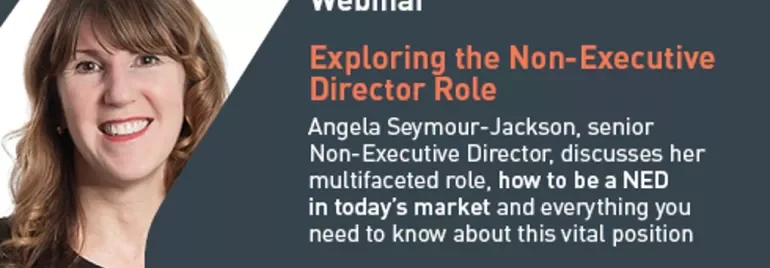Looking to hire your next leader?
Get in touch with one of our consultants now to discuss your leadership talent requirements.


Angela Seymour-Jackson is a highly experienced Non-Executive Director. She currently sits on the board of six companies with a diverse portfolio from start ups to big multinational companies.
After our webinar, Exploring the Non-Executive Director Role with Angela, our audience asked her some follow up questions about what it means to be a Non-Executive Director.
Q: Should your CV for a NED role be different from your CV for an Exec role?
I would say definitely yes. I think you want to emphasize the skills and experience that are most relevant for the NED role. I spoke in the webinar session about the characteristics of a good NED, and I think your CV should also try to reflect these where you can.
Q: You mentioned in the webinar that your transition from the C-Suite to NED took about 5 years. Which obstacles, doubts did you encounter during this time, and did you follow a plan to get to the point of full NED, or did you make your decisions along the way?
While I had decided that my end point was to become fully plural, I was open minded about the route to get there. Although I didn’t plan this way, the fact that I ended up doing an executive role alongside a NED role for several years gave me time to develop my experience, but also gave me certainty that a plural life was right for me. I was challenged quite a lot at the outset about whether I was serious about NED roles or whether I would eventually go back to executive life and it took me a couple of years to really build my confidence operating as a NED. I think its important to recognize that you are always learning, to ask for help and support where you need it and to really commit to your own ongoing development.
Q: Since the range of companies you are working with is very wide, how much expertise do you need about each company and sector to be able to bring value to each of them and do a good job?
I hate to answer by saying “it depends” but to an extent it does. Board members either bring an understanding of the specific sector, or they bring “horizontal” experience such online consumer, or B2B partnerships. However, I think its fair to say that in more complex sectors such as pharmaceuticals, or some FS, you need a strong base of understanding because it is too difficult to get fully up to speed otherwise.
Q: Do you find it harder to really understand the business when you are not an “insider?"
This is definitely the case and points to one of the key skills and requirements of a good NED - your ability to get under the skin of a new business and understand how it works. Part of this will be your ability to question and probe - your curiosity, if you like. But of course it also means you need to be working at a company where you are assisted in this and not held at arms length.
Q: What are your thoughts on the NEDs responsibility towards other stakeholders, for example toward employees, and society?
Historically, the focus has been on the owners of the business, so shareholders in the listed context. However, I think good businesses and good Directors have always understood that the stakeholders are all interlinked, and arguably, if any one relationship isn’t working well it will impact the other. You only have to look at the current challenges Boohoo are facing to see how impactful this can be. More recently governance codes have required listed UK businesses to explain in their annual reporting how they have taken into account the various stakeholders in their business in making their decisions and I would expect this broader focus to become more important going forwards.
Q: Can a NED role be focused on a specific management function, e.g Human capital, Finance, Supply Chain?
Obviously, every position is slightly different so it’s difficult to give one overarching answer, but in my experience Boards may look for a couple of specific areas of expertise, such as finance transformation or change management but would also expect to see broad experience covering some other areas. Often a brief will set out what is “essential” or most desired and then an additional short list of “preferred” characteristics. Perhaps the exception might be in tech or digital where senior expertise and transformational experience is highly sought after.
Q: Do you approach a NED role with a core area of capability you will deliver to the Board or is it more about a general understanding across the business?
I think you need both, to be honest. Broad based business experience is vital for most NED roles, but then I think each NED brings their own more specific expertise. Ideally, across the Board members this covers a lot of the key areas that business is dealing with. Of course you have to think about each NED role and how your experience can be tailored to suit it when you are going through the selection process.
Q: Do you think there is more focus on Diversity and Inclusion in regards to NED candidates?
This has definitely become more of a focus in recent years. In listed firms there has been a strong focus on gender diversity, in part because of shareholder and proxy guidance. Many investors expect to see x% females on a Board for example and may withhold their vote if this is not the case. The spotlight is now shifting to ethnic diversity and I would expect to see more focus on this and more shareholders exercising governance in this area.
Q: Have you experienced being a woman more as an asset or a challenge in your NED role?
I think the focus on diversity, and particularly gender diversity is something I have certainly benefited from. As companies sought to increase diversity, headhunters were often expected to produce 50/50 short lists. So, in that respect, being a woman may have helped get me on a list. However, you still have to be successful through the process and then ensure that your voice is heard around the Board table. For any first time NED there is a learning curve and part of that is ensuring you speak up confidently about issues. Many women have been in that “first time” position and some Boards are better than others at ensuring all voices are heard. I think other groups, such as ethnicity, may face the same obstacles, although I should stress that these are all surmountable!
For more information on Non-Executive Director Roles, make sure to watch the webinar with Angela, Exploring the Non-Executive Director Role.
Get in touch with one of our consultants now to discuss your leadership talent requirements.

Choose your country from the list below to complete the brief form:


